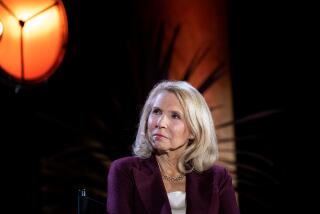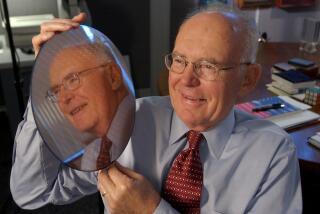Angered by Sale to Rival, Fairchild President Quits
- Share via
Donald W. Brooks, the Fairchild Semiconductor president and chief executive who suffered a bitter blow when a Silicon Valley rival bought his company this summer, has cleaned out his office and quit, saying he doesn’t want to witness the demise of the famous Fairchild name.
It was not a complete surprise. Brooks, 47, had made no secret of his unhappiness with the $122-million sale of industry pioneer Fairchild to Santa Clara, Calif.-based National Semiconductor. The deal had been approved by Fairchild parent company Schlumberger over a competing bid by a Brooks-led management team.
In an interview with The Times early last week, Brooks said he was concerned that the sale would “affect so many jobs and kill a company that was really the beginning of the Valley” and the nation’s high-technology industry.
Left Abruptly
“I’ll be gone as soon as the deal closes,” he said from his hilltop home overlooking the technology-rich valley that grew up around Fairchild and its scores of successful offspring.
Nonetheless, Brooks’ departure came abruptly while the Fairchild sale was still being concluded. He walked out Friday after an emotional farewell at the company’s Cupertino headquarters.
“The reality started hitting people, that it was the end,” Brooks said Monday. “There were a lot of tears, but I’m not sure they were for Don Brooks or for the finality of Fairchild.”
Brooks left two days after government agencies disclosed they would not object to the National sale.
Sought Japanese Deal
An earlier Brooks-promoted offer by Japanese giant Fujitsu had resulted in a protracted Justice Department review that was complicated by strong merger opposition from some Reagan Administration officials.
It was Brooks who had attempted to orchestrate the $200-million Fujitsu sale--a deal in which parent Schlumberger would have sold 80% of Fairchild to the Japanese firm. And it was Brooks who, after the controversial Japanese transaction collapsed, tried again without success to salvage the ailing, 9,000-employee company with a proposed $185-million management buyout.
“Our people were demoralized,” Brooks said of the twin failures to save the company. He told The Times he was even more troubled by the bargain price Schlumberger accepted from National.
“I had always been ready to lose, but when I heard the price I was shocked. I was devastated,” Brooks said.
Hard on Morale
Schlumberger, a French-controlled oil services firm, bought Fairchild for $425 million in 1979 and during the next eight years poured about $2 billion into the chip maker.
Brooks was brought into Fairchild from Texas Instruments in 1983 and became chief executive in 1985, taking over in the midst of an industry recession.
Fears that Schlumberger might shut down the company prompted Brooks to seek a new financial partner in Japan.
Collapse of the Fujitsu deal was hard on Fairchild morale, but employees remained hopeful that a management buyout would preserve the company’s legacy. And although Fairchild’s survival was in some doubt if that buyout failed, National was not welcomed as a savior.
Said one employee: “People were pulling for the management buyout, and felt about National that it was ‘us against them.’ ”






